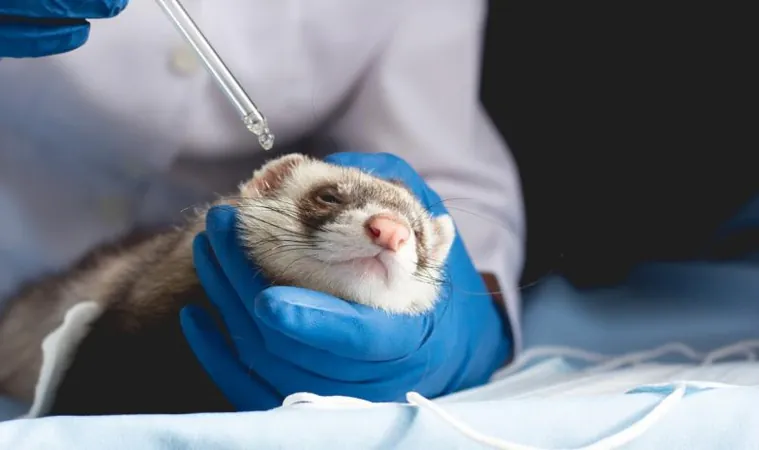
The Intrusive Impact of Nosy Coworkers on Workplace Dynamics
2025-06-29
Author: Ming
We've all faced those pesky coworkers who seem to have a radar for our private conversations. Just as we're delving into something personal, they appear, inching closer, ready to eavesdrop or pry with questions that feel a shade too intrusive.
Distinguishing between genuine curiosity and overstepping boundaries isn’t straightforward. While some embrace sharing their lives openly, others fiercely guard their privacy, leading to a divide in how we perceive nosiness at work.
Breaking Down Work-Related Nosiness: A Scientific Approach
A groundbreaking study from Boston University and the University of Central Florida digs deep into this phenomenon, aiming to define what it truly means to be nosy in a professional setting.
Through surveys of 350 young adults, researchers identified key characteristics of nosy coworkers, noting behaviors such as incessant questioning, gossiping, and pushing for personal details. These findings now enable organizations to identify and track intrusive behaviors with a new measurement framework.
Defining Nosiness: Intent vs. Perception
A pivotal insight from the research is that nosiness isn't merely about someone's actions—it's also about how those actions are perceived by others. Richard Currie, an organizational psychologist, explains that individual differences, such as personality traits and biases, influence whether someone comes across as nosy.
The Disturbing Effects of Nosiness on Workplace Culture
With a clear definition in hand, the researchers explored the ripple effects of nosy behaviors. Unsurprisingly, an environment filled with nosiness leads to employees retracting and withholding vital information—even when it could benefit their teams.
High instances of workplace intrusiveness correlate with increased stress levels and diminished job performance, as workers put up emotional walls to protect themselves.
Competitive Workplaces Breed Nosiness
Interestingly, the study also revealed that workplaces with intense internal competition tend to foster more nosy behavior. Employees, feeling the pressure to outperform one another, become more likely to pry into their coworkers' lives.
Moreover, younger workers were identified as more prone to engaging in nosy conduct compared to their older colleagues, prompting discussions about generational differences in privacy perceptions.
The Role of Supervisors in Workplace Nosiness
The implications of nosiness stretch well beyond casual chit-chat. The research extends to supervisory interactions, revealing that intrusive behavior from bosses can significantly impact employee morale and trust. When supervisors are overly inquisitive, it undermines perceptions of fairness and discourages knowledge-sharing.
Navigating the Pressure to Share
Currie highlights the challenge faced in modern workplaces where authenticity is championed. While the call to be your authentic self can foster openness, it simultaneously blurs the lines between personal and professional, leading to discomfort and potential burnout.
As Currie admits, conducting this research has made him more conscious of his own curiosity at work, reinforcing the importance of understanding the nuanced nature of workplace relationships.
Finding a Balance: How to Handle Nosy Coworkers
The quest for a definitive solution to tackle nosy coworkers continues. Currie emphasizes the natural human curiosity we possess but encourages mindfulness in respecting boundaries. Understanding the thin line between interest and intrusion is crucial—for both personal well-being and workplace dynamics.
In conclusion, while we may be wired to connect with those around us, striking a balance between curiosity and respect for privacy is essential to fostering a healthier work environment.
This enlightening study has been published in the Journal of Business and Psychology, providing valuable insights for both employers and employees.





 Brasil (PT)
Brasil (PT)
 Canada (EN)
Canada (EN)
 Chile (ES)
Chile (ES)
 Česko (CS)
Česko (CS)
 대한민국 (KO)
대한민국 (KO)
 España (ES)
España (ES)
 France (FR)
France (FR)
 Hong Kong (EN)
Hong Kong (EN)
 Italia (IT)
Italia (IT)
 日本 (JA)
日本 (JA)
 Magyarország (HU)
Magyarország (HU)
 Norge (NO)
Norge (NO)
 Polska (PL)
Polska (PL)
 Schweiz (DE)
Schweiz (DE)
 Singapore (EN)
Singapore (EN)
 Sverige (SV)
Sverige (SV)
 Suomi (FI)
Suomi (FI)
 Türkiye (TR)
Türkiye (TR)
 الإمارات العربية المتحدة (AR)
الإمارات العربية المتحدة (AR)